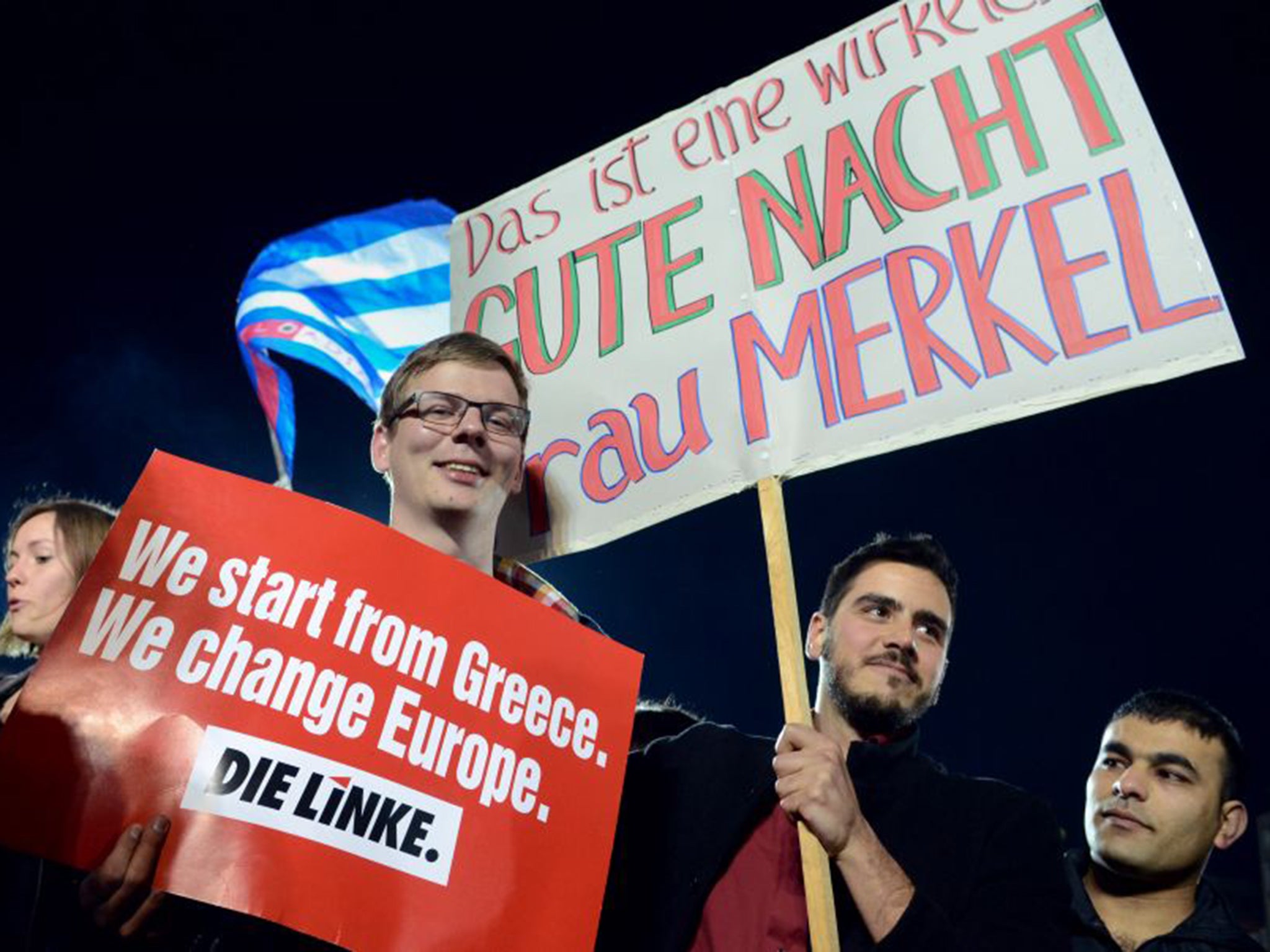As in 1942, Germany must show restraint over Greece
Mussolini tried to warn his ally of the danger of bringing the country to its knees. So should we


Your support helps us to tell the story
From reproductive rights to climate change to Big Tech, The Independent is on the ground when the story is developing. Whether it's investigating the financials of Elon Musk's pro-Trump PAC or producing our latest documentary, 'The A Word', which shines a light on the American women fighting for reproductive rights, we know how important it is to parse out the facts from the messaging.
At such a critical moment in US history, we need reporters on the ground. Your donation allows us to keep sending journalists to speak to both sides of the story.
The Independent is trusted by Americans across the entire political spectrum. And unlike many other quality news outlets, we choose not to lock Americans out of our reporting and analysis with paywalls. We believe quality journalism should be available to everyone, paid for by those who can afford it.
Your support makes all the difference.Here are some quotes from the diaries of Count Ciano (Mussolini’s foreign minister and son-in-law), referring to Greece a year and a half after it was invaded and occupied by Germany.
6 October 1942: “Clodius [the Third Reich’s economics minister] is in Rome to discuss the Greek financial question, which is very bad. If it continues at this rate, sensational and unavoidable inflation will result, with all its consequences…
“All this is absurd, but the German army does not intend to reduce its interest rate.”
8 October 1942 [Ciano tells Mussolini about the Greek situation and quotes his reply]: “If we lose this war it will be because of the political stupidity of the Germans who have not even tried to use common sense, and have made Europe as hot and treacherous as a volcano.”
“He [Mussolini] is thinking of speaking to Himmler about this… but he will not get anywhere.”
In 2015, as in 1942, the Germans tend to overplay a strong hand. They insist that the Greeks abide by austerity agreements that have just been rejected by Greek voters in the general election on 25 January. The reason there was an election at all was that the previous Greek government, drawn from the conservative New Democracy and nominally socialist Pasok parties, could not get enough support in parliament to select a new president because eurozone leaders and the IMF would not relax their terms. The clear message from Greece is that no Greek government can satisfy the demands of the troika (EU Commission, European Central Bank and IMF) and expect to survive.
The Greeks have every reason to reject the troika’s austerity programme. If ever an economic plan failed, it is this one. When the EU and IMF took control of Greek economic policy five years ago, they were meant to solve its debt crisis, modernise the economy and restore it to health. They have demonstrably failed. A quarter of the economy has been destroyed, 26 per cent of the workforce and 57.5 per cent of youth is unemployed, and the economy is in crisis still. Listening to EU officials speak of “progress made”, one is reminded of Tacitus’s line, spoken by a British insurgent leader resisting the Roman occupation, which has echoed down the centuries: “They make a desert and call it peace.”
Do the EU, ECB and IMF officials who visit Athens, often displaying an arrogance and contempt for the views of the Greeks that Tacitus would have found familiar, have much idea of what is happening there? Megan Greene, chief economist for the Portfolio Solutions Group, has studied economic relations between Greece and Germany since 2006. Reflecting on the past five years, she wonders if IMF officials “surrounded by security men in dark glasses” ever met any ordinary Greeks. She recalls an ECB official in Athens being astonished when she told him that many Greeks simply did not have the money to pay their taxes.

The desperation of so many Greeks, four million out of 11 million of whom are on the edge of complete poverty, might not be immediately obvious to an EU delegation in chauffeur-driven cars. But if a member of the delegation looked at the sky he might wonder about the smog hanging over the Greek capital on these cold winter days and, if he inquired further, he would be told that the smog is caused by Greeks burning old doors, scavenged timber and rubbish to heat their homes because they cannot afford electricity or gas. Yanis, a naval officer who helps run a charity to feed the homeless, says he has to bring food to them where they are sleeping in the street because “they cannot come to our kitchen, they are frightened of losing to other homeless people a prized sleeping place near a hot-air vent from the underground, or where there is shelter from the rain”.
Of course, ECB officials and German politicians may say that they don’t care what Greeks think or do. They should have thought about the possible grim consequences for themselves when they borrowed the money they must now repay with no debt relief. Moreover, why aren’t Greeks more grateful for the money that Brussels and Berlin have been doling out to keep them going? Both arguments are spurious. The banks which lent money in the past must have noticed that the country was run by corrupt politicians and crony capitalists, so what happened should not have come as a surprise. Of the €227bn (£170bn) in loans from the eurozone lenders and IMF, just 11 per cent has gone for government spending while almost all the rest barely touched Greece before going to prevent the write-down of bad loans.
All this looks horribly tangled, but, unlike other world crises involving Isis or Ukraine, it is fairly easily soluble. The Greeks cannot pay their enormous debts and the German voters see write-downs and write-offs as theft of their taxes.
The obvious solution is for a rescheduling of debt over a lengthy period at low cost to the Greeks, rather than the present punitive EU-orchestrated regime that has done so much damage since 2010.
I can think of only one similar case of foreign intervention in the supposed interest of reform and restructuring that proved so spectacularly calamitous: in Iraq in 2003-04, earnest American neoliberals took charge of the Iraqi state and economy and ran them straight into the ground. They have yet to recover.
Eurozone leaders should be able to solve the Greek crisis, but it is by no means clear that they will do so. A problem is that they feel all-powerful compared with puny, bankrupt Greece and expect to come out the winner whatever happens. They should be very careful here: I have spent most of my journalistic career writing about crises and wars in places such as Northern Ireland, Lebanon and Iraq, where large countries at first thought they could do what they wanted without fear of local opponents. “Beware of small states,” warned the Russian anarchist Bakunin in 1870, they can be much more dangerous than they look. Half a century earlier, the Duke of Wellington observed: “Great nations do not have small wars.”
Local crises and disputes begin to have international consequences. This happened again and again in Lebanon, a country half the size of Wales, after 1975. When the Americans marched into Baghdad in 2003, their worst mistake was to imagine that it did not much matter how local people reacted in a wreck of a country such as Iraq. Eurozone leaders would do well to take seriously the wise words of Mussolini, not exactly a paragon of moderation, urging the Germans to show common sense in dealing with a Greek financial crisis and warning of the explosive consequences for Europe if they did not.
Patrick Cockburn is the author of “The Rise of Islamic State: Isis and the Sunni Revolution”, published by Verso
Join our commenting forum
Join thought-provoking conversations, follow other Independent readers and see their replies
Comments